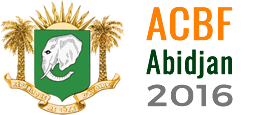Presentation of ACBF

Institutional Framework
The African Capacity Building Foundation (ACBF) was established in 1991 as an independent, non-profit international organization. The Foundation builds human and institutional capacity for good governance and economic development in Africa. To date the Foundation has empowered governments, parliaments, civic society, private sector and higher education institutions in more than 45 countries and 6 regional economic communities. ACBF supports capacity development through investments, technical support, knowledge generation and sharing across Africa. The major sponsors of the Foundation are African and nonAfrican governments, the African Development Bank (AfDB), the United Nations Development Programme (UNDP) and the World Bank.
Governance Structure
ACBF operates on a three–tier governance structure comprising of a Board of Governors, an Executive Board and a Secretariat.
Board of Governors
The Board of Governors comprises representatives of African member countries (ministers of finance, planning or economic development) and partner institutions. The Board of Governors is the highest policymaking body of the Foundation. Its main responsibilities include: setting the broad directions for the operations of the Foundation; appointing the chairperson and the independent members of the Executive Board. The Board of Governors is led by a 5-member bureau, which is elected annually.
Executive Board
The Executive Board is responsible for making the operational policies, guidelines and strategies of the Foundation. The Executive Board meets ordinarily four times a year and is composed of experts in the field of capacity building or economic development. The Executive Board has 12 members, including the Executive Secretary who is an exofficio member. The Executive Board operates with three committees: Operations Committee, Finance and Human Resources Committee and Audit and Risk Committee.
Secretariat
The Secretariat administers the Foundation in accordance with the policies and guidelines set out by the Boards. The Secretariat is led by an Executive Secretary who serves a term of four years renewable only once.
Mandate and Operating Model
Mandate: The creation of ACBF was in response to the shortage of capacity in Africa and the need to invest in indigenous human capital and institutions to foster sustainable development. The Foundation was designed to serve as a coordinating mechanism for donor support to capacity building in Africa, through the pooling of resources and common governance and reporting system.
Approach to Capacity Building
ACBF’s approach to capacity building is based on four (4) major principles:
- Centrality of capacity to the development process in Africa
- Critical role of a partnership and demanddriven approach in addressing the capacity problems.
- African ownership and leadership in the capacity building process.
- A systematic, sequenced and coordinated approach to the capacity building process.
ACBF implements its programs and projects using a combination of its internal competencies and the networks of implementing and technical partnerships as well as knowledge expertise that it has been able to build over the years.
Operating Model:
ACBF operates using two modalities:
(a) Investment in capacity development through the provision of grants and technical support.
Targets include government and non-state institutions at national and regional levels. Typical capacity development activities include a combination of research, training, institutional strengthening, policy dialogue and support to policy formulation and implementation. The initiatives supported by ACBF are either proposed by project promoters (governments and non-state actors) on a demand-driven basis or identified through a capacity needs assessment process.
(b) Knowledge and learning activities:
ACBF conducts research activities on emerging development issues and publishes results through its flagship publication, the Africa Capacity Report as well as occasional papers and books. The Foundation organizes high level forums bringing together decision-makers, development partners, researchers, academics and other development actors to discuss emerging capacity issues and make recommendations on how to address them.
(c) Technical support and program management services.
Follow us on twitter
Tweets sur #acbfabj16

